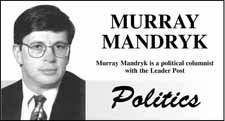One of the more puzzling aspects of the provincial NDP's strategy has been its leader Dwain Lingenfelter's emphasis on rural Saskatchewan.
For reasons beyond the understanding of many, Lingenfelter has been spending a surprising amount of his time and party resources to get the NDP word out in the country.
Those with even the most rudimentary understanding of Saskatchewan politics _ both present and past _ might be especially confused.
In today's Saskatchewan politics where the NDP has only one rural seat, Premier Brad Wall remains wildly popular. According to a recent Angus Reid poll taken in the midst of the teachers' negotiation and other public sector labour disputes, Wall remained the most popular premier in Canada with a 59-per-cent approval rating. And we all know that both Wall and the Sask. Party are significantly more popular in rural ridings than city ones.
For however many brush fires the Sask. Party government has to put over highways or hospital and nursing home bed closures, Wall's is the party that provided the rural Saskatchewan with a massive 80-per-cent reduction in property taxes on agriculture land. This dramatically contrasts with the previous NDP government, saddled with debt and deficit and in need of drastic action to prevent the province from going into bankruptcy.
In fairness to Lingenfelter and the NDP, Wall and his Sask. Party government have far too often in recent years gotten away with the chorus about the NDP cutbacks in the 1990s without any acknowledgement that that drastic things had to be done to deal with the crippling debt and deficits run up by the Grant Devine Progressive Conservatives. So when you ask rural Saskatchewan people what's frustrated them about the NDP, you undoubtedly hear stories about the closure of the 52 rural hospitals, cancellation of the GRIP program or the way the roads turned into potholes in the Roy Romanow-Lorne Calvert era.
But the problem for Lingenfelter, is his party's bad relations with rural Saskatchewan go back much, much further back than the 1990s cutbacks that really only reinforced a divide between the NDP and rural Saskatchewan that was growing long before then.
Ask about when they really first parted ways with the NDP and you are bound to hear stories about emerging philosophical differences from 40 years ago. Farmers still remember stories of the NDP government of the 1970s penalizing farmers with duel axle trucks or its undying support of the Co-ops and the Saskatchewan Wheat Pool at the expense of other alternatives like the private, farmer-owned inland terminals.
What Lingenfelter faces is a long-term parting with rural Saskatchewan occasionally interrupted by political events like the 1991 election when the conservative alternative was so bad that rural voters briefly reconsidered the NDP. The new, de-populated rural Saskatchewan isn't small towns and small farms dependent on a co-operative approach. It relies on commodities and marketing choices. And because of that, it just can't see eye to eye with the NDP.
But this still begs the question of why Lingenfelter is expending so much of his time and resources there. Well, there are a couple reasons.
First, Lingenfelter is grounded in his party roots and stubbornly believes a rural resurgence is possible. And he also believes that his background in farming and the resource sector can win support back.
Second, rural Saskatchewan has its share of teachers, health workers and other Crown and government employees frustrated by aspects of Wall government policy.
Third, party memberships and financial support for the NDP in a lot of these rural ridings remains surprisingly high, so keeping in touch with the rural grassroots is important.
Of course, this hardly means that the NDP will gain ground in rural Saskatchewan.
There again, with only one rural seat now, what does it have to lose?
Murray Mandryk has been covering provincial politics for over 15 years.




